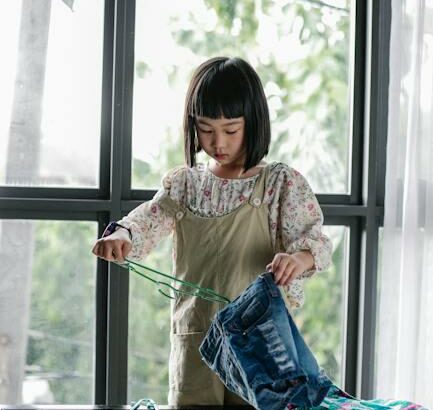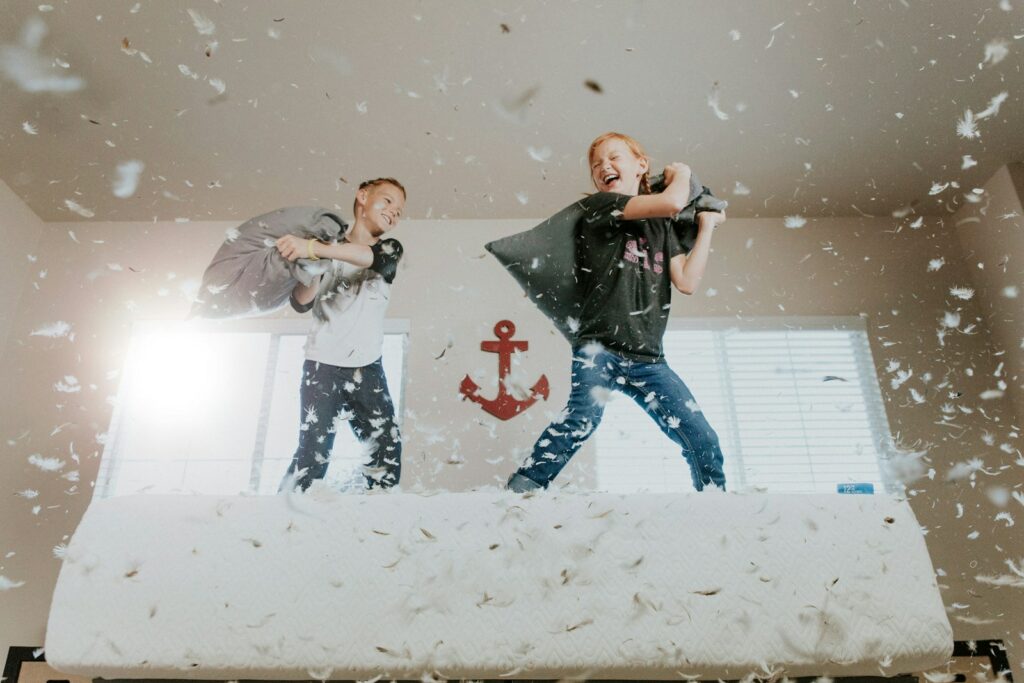
Hey there, busy parents! If you’ve ever felt like keeping a clean and safe home with kids around is an impossible feat, then you’re in the right place.
In this article, we’re going to explore the wonderful world of child-friendly cleaning. We’ll cover safe practices, non-toxic products, and clever strategies for maintaining a sparkling home while keeping your little ones out of harm’s way.
Let’s face it, cleaning with kids is no small task, but with the right approach, it can be done! So grab a cup of coffee and get ready to learn how to make your home a cleaner, safer, and happier place for the whole family.
Table of Contents
- Non-Toxic Cleaners for Homes with Children
- Cleaning Toys: Guidelines for Hygiene and Safety
- Child-Safe Pest Control Methods
- Sanitizing Children’s Play Areas: A How-To Guide
- Laundry Safety: Tips for Families with Young Children
- Crafting a Child-Friendly Cleaning Routine
- The Best Child-Safe Cleaning Tools and Equipment
- Educating Kids on Cleaning and Organizing
- Balancing a Clean Home with Playful Messes
- Baby Room Cleaning Checklist for New Parents
- Questions & Answers For Child-Friendly Cleaning: Safe Practices for Households with Kids
- To Wrap It Up
Non-Toxic Cleaners for Homes with Children
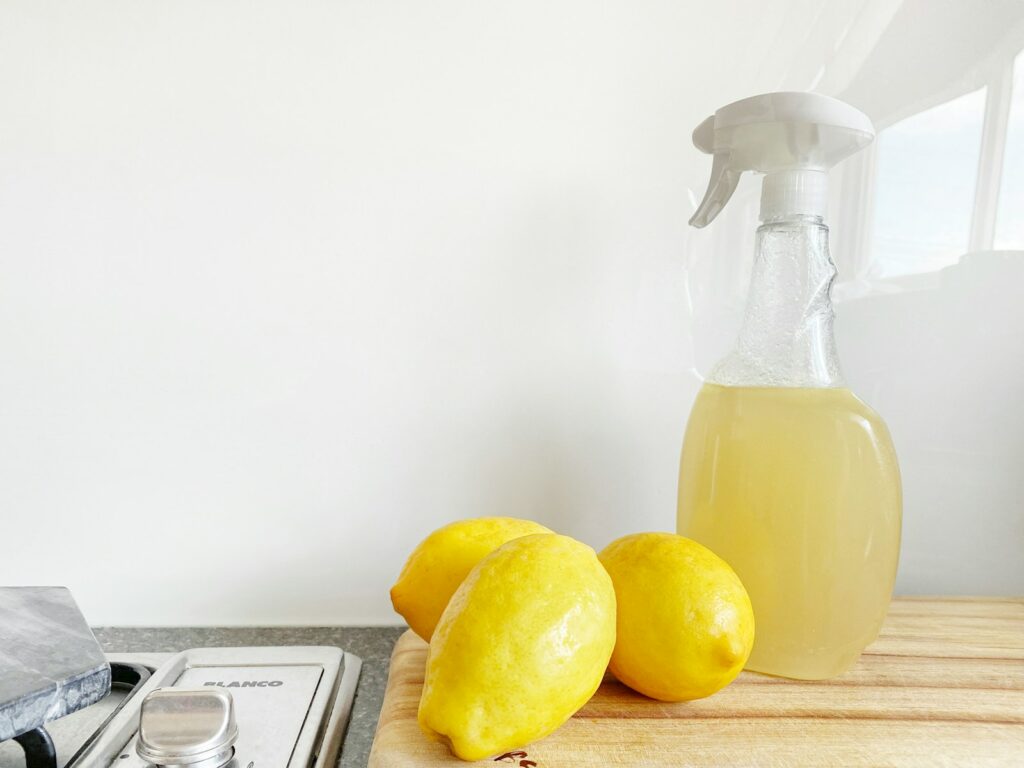
When it comes to keeping your home clean and safe for your little ones, using non-toxic cleaners is essential.
Here are some child-friendly cleaning practices to keep in mind:
Choose natural ingredients: Look for cleaning products that are made with natural and non-toxic ingredients, such as vinegar, baking soda, and essential oils. These options are safe for children and pets, and they also work well to keep your home clean and fresh.
Avoid harsh chemicals: Skip the cleaners that contain harsh chemicals like ammonia, bleach, and phthalates. These chemicals can be harmful to young children, causing respiratory issues and skin irritation. Opt for gentler alternatives that are free of these harmful substances.
DIY cleaning solutions: Consider making your own non-toxic cleaners using simple ingredients like water, vinegar, and lemon juice. Not only is this an affordable option, but it also gives you full control over what goes into the cleaning products you use in your home. Plus, it’s a fun and educational activity to involve your kids in!
Learn more in our in-depth article [Non-Toxic Cleaners for Homes with Children].
Cleaning Toys: Guidelines for Hygiene and Safety
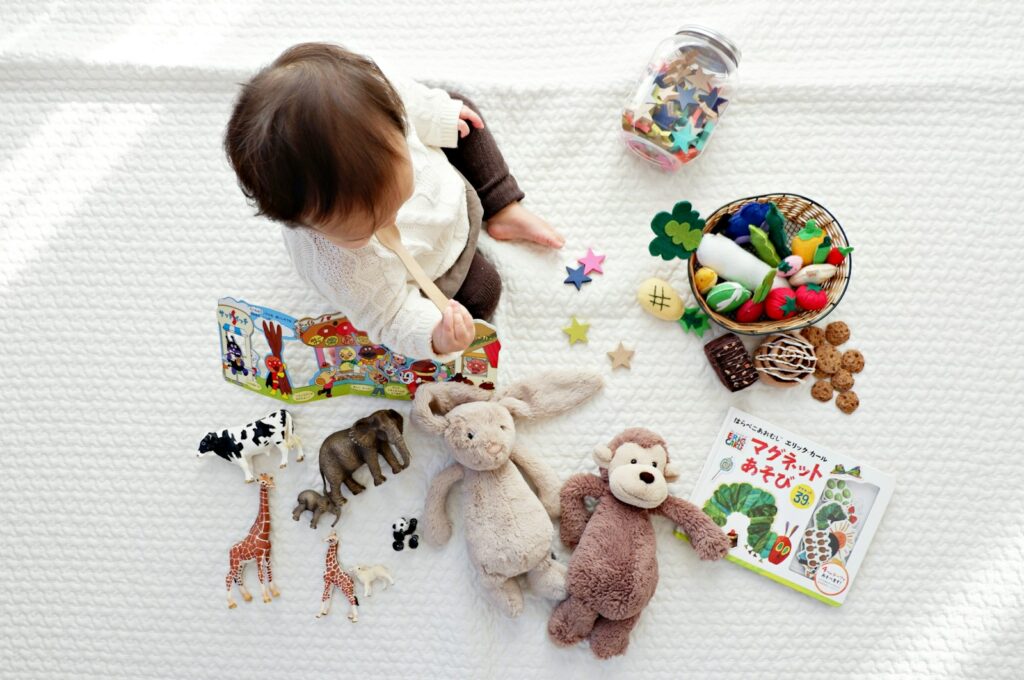
When it comes to keeping our kids safe and healthy, cleanliness is key. It’s important to ensure that the toys our little ones play with are not only fun, but also hygienic.
Here are some child-friendly cleaning practices to maintain a safe environment for households with kids:
Use gentle, non-toxic cleaning products
When cleaning toys, it’s crucial to use cleaning products that are safe for kids. Look for non-toxic options that are free from harsh chemicals and fragrances, and always check the label for any warnings. Opt for natural alternatives like vinegar, baking soda, and mild dish soap, which are effective at cleaning and disinfecting without posing any health risks.
Regularly disinfect toys
Children love to touch and explore everything around them, which means their toys can quickly become breeding grounds for germs. Regularly disinfecting toys is essential to prevent the spread of bacteria and viruses. Use a solution of water and an eco-friendly disinfectant to wipe down toys, paying special attention to areas that come in direct contact with the child’s mouth.
Wash plush toys and fabric items
Plush toys, blankets, and other fabric items can harbor dirt, dust, and allergens, making them prime candidates for a good wash. Always refer to the care label for washing instructions, and opt for a gentle detergent that is suitable for sensitive skin. To ensure thorough cleaning, consider using a mesh laundry bag to protect delicate fabrics and prevent any damage during the washing process.
Explore more details in Cleaning Toys: Guidelines for Hygiene and Safety.
Child-Safe Pest Control Methods
When it comes to keeping your home pest-free, you want to ensure that the methods you use are safe for your children.
Here are a few child-friendly cleaning and pest control practices to keep your household safe:
1. Natural Repellents
Using natural repellents such as essential oils and herbs can help deter pests without posing any harm to your children. Some effective natural repellents include:
- Lavender oil: Repels mosquitoes and moths
- Peppermint oil: Deters ants and spiders
- Citrus peels: Discourages ants and roaches
2. Safe Traps
If you have a pest problem, using safe traps can help manage the issue without using harmful chemicals. Consider using:
- Rodent traps: Traps that capture rodents without harming them
- Flypaper: Sticky traps that prevent flies from bothering your family
3. Cleaning Practices
Regular cleaning and maintenance can also help prevent pests from entering your home.
Here are some child-friendly cleaning practices to incorporate into your routine:
- Store food properly: Keep food in sealed containers to prevent attracting pests
- Fix leaks: Repair any leaks to eliminate potential water sources for pests
- Vacuum regularly: Remove crumbs and debris that can attract pests
Read more in [Child-Safe Pest Control Methods].
Sanitizing Children’s Play Areas: A How-To Guide
When it comes to keeping children’s play areas clean and sanitized, it’s essential to use child-friendly cleaning practices. Not only do you want to make sure the surfaces are free from germs and bacteria, but you also want to ensure that the cleaning products you use are safe for kids.
Here’s a simple guide to sanitizing children’s play areas in a safe and effective way.
First and foremost, it’s important to choose cleaning products that are specifically formulated for use around children. Look for products that are non-toxic and free from harsh chemicals. Some child-friendly cleaning products include:
- All-purpose cleaners
- Disinfectant wipes
- Mild dish soap
Next, be sure to regularly clean and sanitize commonly used items in the play area, such as toys, books, and furniture. Here’s a step-by-step guide for sanitizing these items:
| Step 1 | Wipe down toys and books with disinfectant wipes. |
| Step 2 | Wash fabric toys and bedding in the washing machine with mild detergent. |
| Step 3 | Clean and disinfect hard surfaces with an all-purpose cleaner. |
Check out more exciting options in the full article [Sanitizing Children’s Play Areas: A How-To Guide].
Laundry Safety: Tips for Families with Young Children
When it comes to keeping your home clean and safe for your little ones, it’s important to take extra precautions in the laundry room.
Here are some tips to ensure that your child stays safe around laundry products and equipment:
- Store laundry products out of reach: Keep detergents, fabric softeners, and other laundry products locked away or placed on high shelves to prevent accidental ingestion by curious children.
- Use child-proof containers: Consider using child-proof containers for storing laundry pods and other products that may look appealing to young kids.
- Keep the laundry room locked: If possible, install a child-proof lock on the laundry room door to prevent unsupervised access to the area.
By following these child-friendly cleaning practices, you can ensure that your laundry room remains a safe and secure place for your family.
For more safety tips check out our complete [Laundry Safety: Tips for Families with Young Children] article.
Crafting a Child-Friendly Cleaning Routine
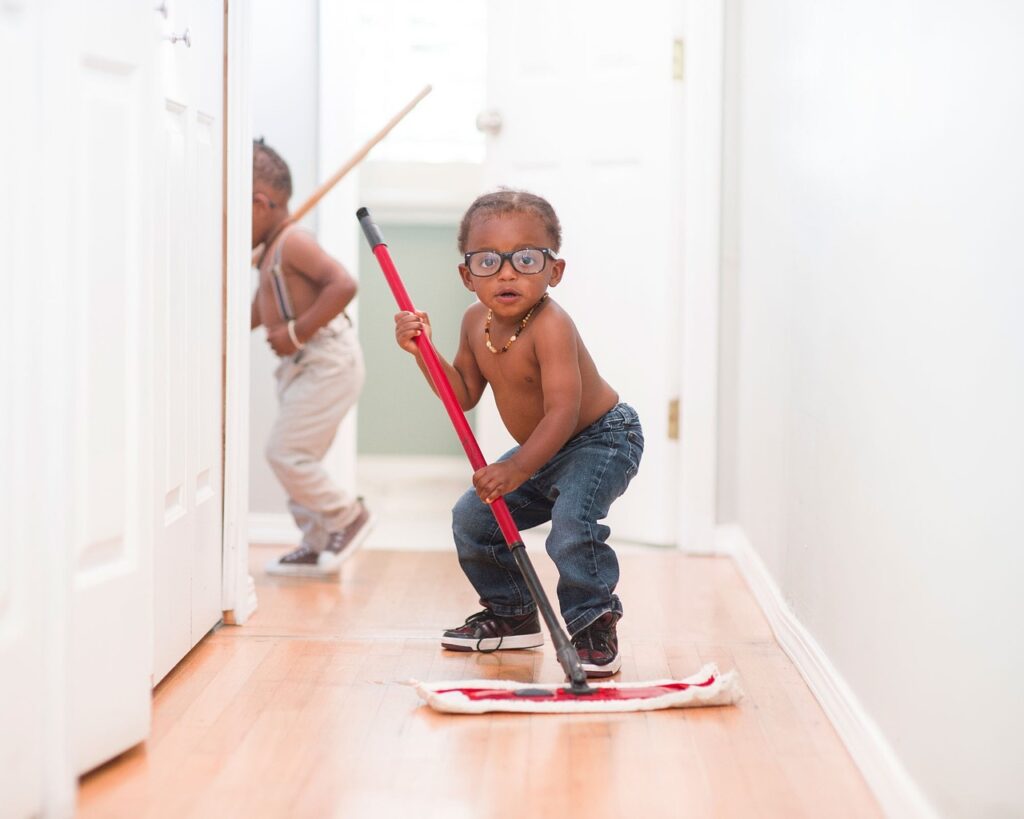
Keeping your home clean and organized is important, especially when you have children running around. However, it’s equally vital to use safe and child-friendly cleaning practices to ensure the well-being of your little ones.
Here are some tips on how to create a cleaning routine that is safe for households with kids.
Use non-toxic cleaning products
Opt for natural, non-toxic cleaning products that are safe for children and pets. Look for eco-friendly alternatives to harsh chemical cleaners, and always check labels for any harmful ingredients. Consider using vinegar, baking soda, or essential oils for a gentle yet effective clean.
Store cleaning supplies out of reach
Children are naturally curious, so it’s crucial to store cleaning supplies in locked cabinets or high shelves. Keep them out of reach to prevent accidental ingestion or exposure to harmful chemicals. Invest in childproof locks for cabinets where cleaning products are stored to ensure your child’s safety.
Involve your kids in the cleaning process
Make cleaning a fun and educational activity by involving your kids in age-appropriate tasks. This not only teaches them responsibility but also instills good cleaning habits from a young age. Assign simple chores like dusting, folding laundry, or picking up toys to make cleaning a family affair.
Learn more by checking out the full exciting article [Crafting a Child-Friendly Cleaning Routine]!
The Best Child-Safe Cleaning Tools and Equipment
When it comes to keeping a clean and tidy home, it’s important to consider the safety of your children. Child-Friendly Cleaning: Safe Practices for Households with Kids is a top priority for any parent, and that starts with using the right tools and equipment.
Here are some of that every household with kids should have:
Non-Toxic Cleaning Solutions: Look for cleaning solutions that are free from harsh chemicals and toxins. Opt for natural and eco-friendly products that are safe for children and pets. Companies like Mrs. Meyer’s Clean Day and Seventh Generation offer a wide range of non-toxic cleaning solutions that are perfect for households with kids.
Microfiber Cloths: Microfiber cloths are excellent for cleaning surfaces without the need for harsh chemicals. They are reusable, durable, and perfect for wiping down countertops, tables, and other surfaces. Plus, they are safe and gentle enough for kids to use, making them a great tool for teaching children about cleaning responsibilities.
| Recommendation | Why Choose It |
|---|---|
| Mrs. Meyer’s Clean Day | Offers a wide range of non-toxic cleaning solutions perfect for households with kids |
| Seventh Generation | Provides eco-friendly cleaning products that are safe for children and pets |
For more engaging information on this subject, please check out [The Best Child-Safe Cleaning Tools and Equipment] the full article!
Educating Kids on Cleaning and Organizing
When it comes to keeping a clean and organized household, it’s important to involve kids in the process. Not only does this teach them valuable life skills, but it also helps to create a sense of responsibility and pride in their living environment. In this section, we will be discussing child-friendly cleaning practices that are safe and appropriate for households with kids.
- One of the most important aspects of is to make sure that the products and tools they are using are safe for them to handle.
- It’s essential to choose non-toxic, child-friendly cleaning products that are gentle on their skin and free from harsh chemicals.
- Additionally, providing them with age-appropriate tools, such as smaller brooms and dustpans, can make the cleaning process feel more fun and manageable for them.
Another key aspect of is to instill good habits from a young age.
- Setting a regular cleaning schedule and making it a part of their routine can help them understand the importance of maintaining a clean and tidy living space.
- Encouraging them to declutter their belongings and organize their toys and personal items can also promote a sense of order and responsibility.
Get more comprehensive tips and details in our full article [Educating Kids on Cleaning and Organizing].
Balancing a Clean Home with Playful Messes
When it comes to maintaining a clean home while allowing your kids to be kids, finding the right balance is crucial. this article Child-Friendly Cleaning: Safe Practices for Households with Kids offers practical tips and tricks for keeping your home clean and safe without sacrificing the fun and creativity of childhood. With a few simple strategies, you can create a space that is both tidy and welcoming to your little ones.
To achieve a harmonious environment, consider implementing the following child-friendly cleaning practices:
- Use non-toxic cleaning products: Opt for natural, child-safe cleaners to minimize exposure to harmful chemicals.
- Create designated play areas: Designate specific spots in the home where your kids can freely play and unleash their creativity, making it easier to contain messes.
- Instill clean-up routines: Encourage your children to participate in maintaining the cleanliness of their play areas, teaching them responsibility and organization.
In addition to these practices, it’s important to strike a balance between cleanliness and playfulness. Embracing the joyful chaos of childhood while maintaining a clean and safe environment is possible with a little creativity and flexibility. Child-Friendly Cleaning: Safe Practices for Households with Kids explores various methods to achieve this balance, helping you create a home that is both inviting and hygienic for the whole family.
Read the following to find out more [Balancing a Clean Home with Playful Messes]!
Baby Room Cleaning Checklist for New Parents
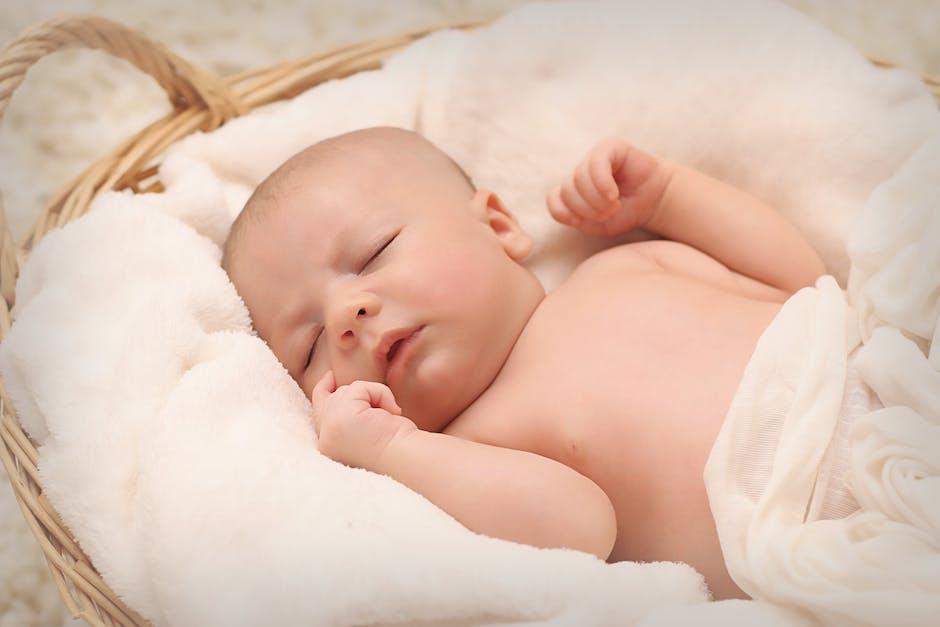
Welcome to the wonderful world of parenting! As a new parent, creating a safe and clean environment for your baby is a top priority. From keeping the nursery spotless to ensuring that all cleaning products are child-friendly, there are many things to consider when it comes to maintaining a clean home with a little one around.
Here’s a child-friendly cleaning checklist to help make the process easier for you.
Child-Friendly Cleaning Products
When it comes to cleaning your baby’s room, it’s important to use products that are safe and gentle. Look for cleaning products that are labeled as “child-friendly” or “baby-safe.” These products are formulated to be gentle on your baby’s sensitive skin and respiratory system. Avoid using harsh chemicals and opt for natural, non-toxic cleaners whenever possible.
Here are a few child-friendly cleaning products to consider:
- Babyganics All Purpose Surface Wipes
- Puracy Natural Baby Multi-Surface Cleaner
- Seventh Generation Disinfecting Multi-Surface Cleaner
Cleaning Schedule
It’s easy for new parents to feel overwhelmed with the responsibilities of caring for a baby, but having a regular cleaning schedule can help keep things under control. Aim to do a quick tidying up of the nursery every day, and schedule a deep clean once a week. Focus on areas that tend to accumulate dust and germs, such as the changing table, crib, and floor.
Here’s a sample cleaning schedule to help you stay organized:
| Day | Task |
|---|---|
| Monday | Vacuum and mop the nursery floor |
| Wednesday | Wipe down all surfaces with baby-safe cleaner |
| Saturday | Wash bedding and stuffed toys |
Safe Storage of Cleaning Products
As your baby grows and becomes more mobile, it’s important to ensure that cleaning products are stored safely out of reach. Consider installing child-proof locks on cabinets where cleaning products are kept. Store all cleaning products in their original containers and never transfer them to unlabeled bottles or containers. Keep cleaning products in a high, locked cabinet or shelf to prevent accidental ingestion or exposure.
Don’t miss more exciting tips in [Baby Room Cleaning Checklist for New Parents]!
Questions & Answers For Child-Friendly Cleaning: Safe Practices for Households with Kids
How can I make my cleaning routine more child-friendly?
You can start by choosing safe and non-toxic cleaning products, storing them out of reach of children, and involving your kids in the cleaning process in a fun and educational way.
What are some child-friendly cleaning products I can use?
You can use vinegar, baking soda, and lemon juice for natural and non-toxic cleaning. There are also many eco-friendly and child-safe cleaning products available in stores.
How can I involve my kids in the cleaning process?
You can turn cleaning into a game, give them age-appropriate tasks, and teach them about the importance of keeping a clean and tidy household.
What safety precautions should I take when cleaning with kids around?
Always keep cleaning products out of reach, use child-proof caps, and educate your kids about the dangers of certain cleaning products.
How can I ensure that my kids are not exposed to harmful chemicals while I clean?
You can opt for natural and non-toxic cleaning products, ventilate the area while cleaning, and use gloves to protect your skin from harsh chemicals.
Are there any specific cleaning tasks that should be avoided when kids are around?
Avoid using aerosol sprays, strong chemical cleaners, and cleaners with strong fragrances when kids are present. Also, keep kids away from areas that have been recently cleaned with strong chemicals.
What are some child-friendly cleaning tools I can use?
You can use microfiber cloths, sponges, and child-sized cleaning tools to make cleaning more accessible and fun for kids.
How can I teach my kids about the importance of cleanliness and hygiene?
You can lead by example, explain the reasons behind each cleaning task, and create a routine that emphasizes the importance of cleanliness and hygiene.
What are some creative ways to motivate my kids to clean?
You can use incentives like rewards or screen time, create a cleaning chart with stickers for completed tasks, and turn cleaning into a fun and interactive experience.
How can I make cleaning a positive experience for my kids?
You can play upbeat music, set a timer for cleaning sessions, and praise and encourage your kids for their efforts in cleaning.
To Wrap It Up
So there you have it, folks! Keeping a clean and safe environment for your kiddos doesn’t have to be a daunting task. By incorporating child-friendly cleaning practices into your household routine, you can ensure that your little ones stay healthy and happy. From opting for natural cleaning products to involving your kids in the cleaning process, there are plenty of simple ways to make your home a safe haven for your family. So go ahead, put on some music, grab your little helpers, and let’s make cleaning a fun and healthy experience for everyone!
